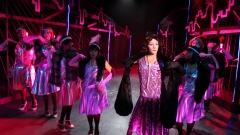Underground Pool: The Wolf
By Kaihly Brouhard '12 (Illustration)
We didn’t listen to the radio when the Germans were around. The soldiers did not take kindly to the ideals of de Gaulle or French patriotism. They much preferred our brandy and wines to the possibility that we would find strength to give them trouble. At twelve, though, I did not miss the voices my father craved each night.
Instead I spent my time tracing the corridors of our estate, watching the sleek black cars come and go through the sectioned windows on the second floor. Occasionally, if he managed to catch me pressing my face against the glass, my father would dictate to me the makes and models. Most were of French origin— Citroens—but still only ever brought Germans. From their doors came officers and politicians dressed in a variety of colors. Each bound his bicep with a band of red. The “dogs of Deutschland,” my father sometimes called them, when the house was empty and only my older sister Josephine and I were around to hear the thick sounds of foreign words on his tongue. Those days were few and far between.
The Germans liked our home because it had many rooms for their soldiers to reside in and was decorated in the most elegant of fashions. They liked being waited on and catered to. They liked the barrels of Guignolet in our cellar and the intricate molding on the walls. They liked the company of Josephine and my father. “Marzel,” they’d say, clasping my father’s hands when they paraded through our doors, their black winter trenches dusted with February snow. They greeted him as a friend, then as a host, and finally as a subordinate. By the end of the week, when they were called away again, my father had reached his boiling point, shouting “Marcel Duquesne!” to the unresponsive walls. “Marcel! Is it that hard for those beasts to pronounce?”
He hated them. I did too—to some extent. When the Germans showed up, the chocolate, cheese and butter disappeared. The servants ran themselves into the ground hunting for good meat and soap to wash the extra bedding. There was a night, toward the end of the month, when they went through nearly our entire supply trying to get blood out of our towels. That was the night they’d brought him in.
Sturmbannführer Kasch Reinhart hadn’t shown up in his own polished Citroen or clasped my father’s hand on the way in the door. I spotted the boxy ambulance from my usual window after hearing the rumbling of its engine coming down our drive. I had been so excited for a change of pace that I almost threw myself down the stairs to wait in the front hall. My father and Josephine were quick to appear, neither looking nearly as enthused as I felt. They had their secrets back then and I hadn’t understood, until later, that they dreaded the arrival of the Major.
Kasch was dragged through our door by a handful of soldiers, oozing streams of red from somewhere under his fur-collared officer’s jacket. At that moment, I was more fascinated than disgusted with the appearance of the Aryan. He was the kind of man who set our whole château into a frenzy. His presence created an energy in the household and in me. His white-blond hair contrasted with the black of his jacket. His features were sharp but smoother than those of other Germans I had seen, with similar decorations on their coats. He did not have a wrinkle save the marks from his distressed expression. He observed the world without focus until his eyes landed on me. I was struck by how blue they were, clear like the light from the moon. They paraded him through the hall like a prince, fluttering about at every little gasp he made. My father shouted orders to the scattering servants and they returned with bowls of water and brand-new bandaging. In all the commotion, I was able to follow the procession up the first flight of stairs and into one of the grander guest rooms. Josephine caught me at the door.
“If he dies . . . ” she said, her voice soft but commanding. “You’re going to go into the cherry fields and wait there for me.”
“What are you going to do?”
I felt the pressure of her grip tightening on my shoulder. She said nothing.
“What is Father going to do?”
“Don’t worry about that now. Go to your room.”
I did as I was told, but found the stillness as unbearable as Father found the silence of the radio. Josephine did not come to get me that night, but I dreamt about running through the fields and seeing all the cherries bleed. The streams of red became wax seals on the backs of the unaddressed envelopes Father always sent me into town with. I awoke to the smell of soap still lingering on my pillow.
The servants changed Kasch’s bedding and bandages twice a day. Josephine informed me that he had suffered a deep stab wound to his right side and that the Germans did not trust the hands of the local hospitals. Sickness raged in the poor areas of town, and health supplies were low everywhere else. My father, though long past waiting on patients regularly, was the next best thing. Our home, with its wine-filled cellars and high ceilings, was the only house in the area with a surplus of medical equipment. We had more supplies than even the Germans knew, maybe even more than I did. My father spent a fortune on it all. He bought bandages and disinfectants, clothing and ammunition—food, armor, weapons, tires, gasoline, matches and candles. My father hid his supplies in the deep dust-covered crevices of the house. He pried up floorboards and sent secret messages out into the night. Only Josephine’s lips spoke my father’s ideas to his allies, hidden in the back corners of bars. Only I returned from visiting the market with hundreds upon hundreds of francs in my little woven basket. Marcel Duquesne was a local checkpoint for the French Resistance.
If Kasch had died, my sister told me long after the war ended, they would have burnt the house to cinders sooner. They would have destroyed every ounce of evidence that an uprising was coming. We would have run through the cherry fields all the way to Switzerland instead of facing an inquisition.
But Kasch lived through that night and the ones that followed, until my father feared he would die of starvation instead. The German officer absolutely refused to eat anything presented to him by the servants. Even my pretty sister, with her honey-colored hair and her charm, was unable to sway him. The fear of being investigated and discovered grew on my father so heavily that he put a halt to his exchanges with other Resistance members for the time. As a last resort, he set a tray in my hands and directed me up to the room that I had been forbidden to visit since the Major’s arrival.
“Do not come out until he has eaten, but do not force him.” These were the instructions bestowed on me. I swallowed the growing ball of nerves building in the back of my throat and carried the meal steadily to its destination.
Kasch regarded me suspiciously when I appeared in his room. I felt my excitement sink into the depths of my gut. He didn’t want me there. No. He didn’t want anyone there. His piercing gaze told me so. I found myself unable to meet that sharp blue, instead focusing my stare on the folded uniform resting on his bedside chair.
When he opened his mouth, I was assaulted by a slew of harsh sounds. They were words maybe, heavy on his tongue and in my mind. He spoke in quick syllables. I didn’t understand him but he continued on, granting only short pauses to wait for responses. I was beginning to feel overwhelmed by the task my father had given me.
In my hands, the sound of the china shaking on the silver tray caused him to stop. His empty glare fell from my face to the dishes in my hands and his voice faltered. When he spoke again, it was with words I understood. “Your name, what is it?”
“Elodie Duquesne.”
“Have you come to kill me?”
“I don’t think so.”
“Then you are of no use to me. Get out.”
I was frozen in place, my father’s words echoing in my head.
“I can’t.”
He said nothing. I dared to look up, but he was no longer watching me. Without his cold eyes or his fur-collared jacket, he looked more human than I had remembered. No parade of underlings stood watch to answer his every bark. He looked smaller, younger, more concrete. I imagined the muscle of his chest moving slightly with each heartbeat. Not that it would make him seem like any less of a dog in my father’s eyes.
It was then that I was stricken with the fleeting memory of a fairy tale Josephine had once told me. “Are you a wolf?” I asked.
He turned back to me in surprise. “A what?”
“A wolf . . . like the story. Is that why you won’t eat? The wolf in the story wanted to eat pigs, but it’s hard to get pig here . . . ”
He didn’t seem to understand what I was asking.
“There’s three,” I continued. “Pigs. And the wolf comes and he huffs—”
“Nein! No. I know the story but it’s English. I’m German. German wolves don’t eat pigs.”
“What do they do then?” The tinkering of the china had settled and I felt calm enough to venture closer. I placed the tray on his bedside table, out of the way.
Kasch pondered my question for a moment, then relaxed a little and answered. “They hunt.”
Josephine was baffled by my obsession with Kasch and even more so by his tolerance of me. Three times a day, I would venture up to his room with a tray in my hands and he would tell me German stories about witches that lived in gingerbread houses. He told me about frog princes and the sad love of a mermaid.
“And the wolf rose up from her grandmother’s bed and devoured her and her red riding cape whole!” he exclaimed, almost knocking the tray off his lap.
I squealed with laughter, catching the clear plate before it slid to the floor. He helped me set it safely to the side. “That’s terrible! Who saved her?”
“No one.” He grinned. “German stories are about morals, not about happy endings. It wasn’t about her living happily ever after, but about the mistake she made that led to her destruction.”
“That really is terrible.”
“You didn’t think the other ones were terrible.”
“Yeah, but those ones didn’t have a big bad wolf!”
He hesitated, smile faltering. “Big bad?” I saw something fleeting pass through him, like the chill of a ghost in the night. After a moment, he continued, attempting to renew his smile. “I suppose he’s bad . . . but you can forgive him, right? He wasn’t trying to be mean. He was just doing what he had to in order to survive.”
I mirrored his expression, oblivious to the deeper meaning of his words. “I’ll forgive him.”
He put his hand on my head gently and ran his fingers over the curls. “Next time, I’ll make him a good wolf, I promise.”
When he ran out of tales, he didn’t make me leave and he didn’t stop talking. I learned about his own little sister and the forests of Germany. He told me about his mother’s chocolate cake and a great and wondrous clock tower that told stories with life-size dolls. I listened like my very life depended on it. After each of his stories, I would return downstairs with a million new daydreams and an empty tray.
My father was thrilled by this development. Kasch’s improving health meant that my father wouldn’t have to worry about the officer dying in our hands. No longer fearing an investigation or possible punishment from the invaders, he began to network once again. I saw less of Josephine at night and more strange vehicles coming and going down our drive. They were not Citroens. They did not bring Germans.
In fact, it had been so long since any Germans had stayed with us that I was beginning to question their absence. Kasch only quirked his eyebrow at me when I asked where they had disappeared to.
“They are all fighting,” he offered, after chewing and swallowing the andouillette in his mouth. “There is the war and then there are the rebels. They are making it harder for the troops to get supplies, so the Schutzstaffel must hunt them down and stop the attacks on the cargo deliveries.”
“The SS hunts the Resistance?”
“Yes.” He spooned some more sausage off the plate in his lap.
For the rest of my life, I would remember the cold chill that crept down my spine.
“Are you Schutzstaffel?”
He froze, features tensing as if he’d been assaulted by a fist rather than by memories I could have never comprehended—would never be able to imagine, even after hearing the truth. For a long moment he sat there silently. He stared out into nowhere and his breathing slowed until I feared that he had died, just like that—left me in the room alone to face the soldiers that would come for his body and my head.
But then he spoke and the trance was broken. I only saw the aching rising and falling of his chest. I wondered to what faraway place he had gone.
“The thing I hate most about your rebels,” he said, “is that not a single one knows how to wield a knife.”
Kasch fell into another bout of hungerless sulking and silence while I returned to my ritual of delivering and retrieving unmarked envelopes from the Resistance allies in the marketplace. My father made a lot of deliveries when the Germans weren’t around. The French Resistance was gaining power. They were now aiding the British soldiers in moving through the country. There were checkpoints all over France that my father supplied with provisions. When the rebels raided German cargo, they sent their loot to us. I watched the bulky trunks come and go from the window, but all I could worry about was Kasch’s disinterest in his own health. I wondered if I was to blame. My words had seemed to send him back into the self-loathing isolation he’d insisted on when he arrived. Despite my attempts to get him to eat, he often refused. He also refused to look at me. I grew to miss him.
It was at dinner one night, in the middle of March, that I found him bare-chested and upright in his bed. The bandages that usually bound his torso pooled around his waist, while he dug at his stitches with bare fingers. There was blood down his side, in the sheets, and on the floor. Still he eagerly pressed his fingers at the wound.
I yelled at him in my native language, attacked him with pleads and curses and pity.
“Let me go,” he insisted. “Let me just end here. I deserve it. I have done the most wretched things.” His face was pale and slick with sweat. “There is no redemption here. My guilty pleasure of devouring power is now eating me from the inside. Can’t you see?”
“And what will we do then?” I screamed at him. “If you die like this, the SS will come and they will find you dead and they will search the house and find all of the things like Father said and they will shoot us in the—”
I stopped short when I realized he was no longer fighting me off. Kasch’s eyes were wide, his breathing slow. There was a sound, like the churning of gravel from a car outside. It sounded like the growl of a beast.
“You are Resistance,” he said.
Just like that, Kasch was a stranger to me. He had greeted me as a host, then as a friend, and finally, when he learned the truth about why my family watched over him so carefully, as the enemy. I was terrified. His ice cold eyes sent frost down my spine. It had been a mistake, just one silly mistake. I had ruined everything!
“I will give you a minute and a half to run,” he declared.
“Kasch!”
“Run, Elodie, and don’t look back.”
So I did. I took off down the hallway, past the window that overlooked the drive. I ran down the staircase and through the first floor corridors. I ran all the way out into the wet cherry fields until I was out of breath and could barely see the house. It dawned on me then that I had forgotten all about my sister and father. I hadn’t warned them, and certainly Kasch would have them hunted down first. There in the cherry fields, I sat in the mud and cried. Terror encased me; misery became me. I remembered my dream of the bleeding fruit and longed for the smell of stolen soap.
For at least an hour I must have sat there, eyes wet and heart beating rapidly. I didn’t dare move until I heard the sound of my name being called. My head shot up just as Josephine came bursting through the rows of cherry trees, my father just behind her.
“Elodie! Thank God!” She wrapped her arms around me and pulled me up out of the mud. “I thought they might have gotten you!”
“They?”
“The Germans! Oh, Elodie . . . it’s all gone wrong.”
I felt my guilt swell up in my chest. “I’m sor—”
“One of our informants was a spy. He handed a list right to them! He gave them all of our names. If I had known . . . this wouldn’t have happened. If I hadn’t spoken to him the other night, he wouldn’t have known where to find us.”
“It’s not your fault, Josephine,” my father interrupted. It would take him only weeks to talk me out of my guilt. It would take him years and the aid of her Swiss lover to talk my sister out of hers.
“It’s all gone wrong, Elodie. The Major can only hold them off so long. Come. We have to go.”
I was dumbfounded and frozen solid. My father lifted me into his arms and carried me through the fields as I tried to piece everything together. In my head, I replayed my conversation with Kasch over and over again until all I could hear was the sound of his voice telling me to run and the churning of the gravel outside. I realized that he must have recognized the sound of his own kind.
When I glanced back over my father’s shoulder, smoke billowed up from the château. Flames turned everything I had known to cinders.
I prayed for Kasch’s safety. My father and sister said nothing.
Each and every night after that, when my father turned on the radio, I sat beside him in the old oak chair of our Swiss sitting room, listening carefully for the name of the Major. Each time I was relieved not to hear it. Each time I wondered if he had earned his redemption by liberating us. On the coldest of nights, long after the war had ended, I imagined the howling of the wolves to be Kasch in his fur-collared jacket, hunting a pig or chatting with a small, red-cloaked girl deep within the forest.





